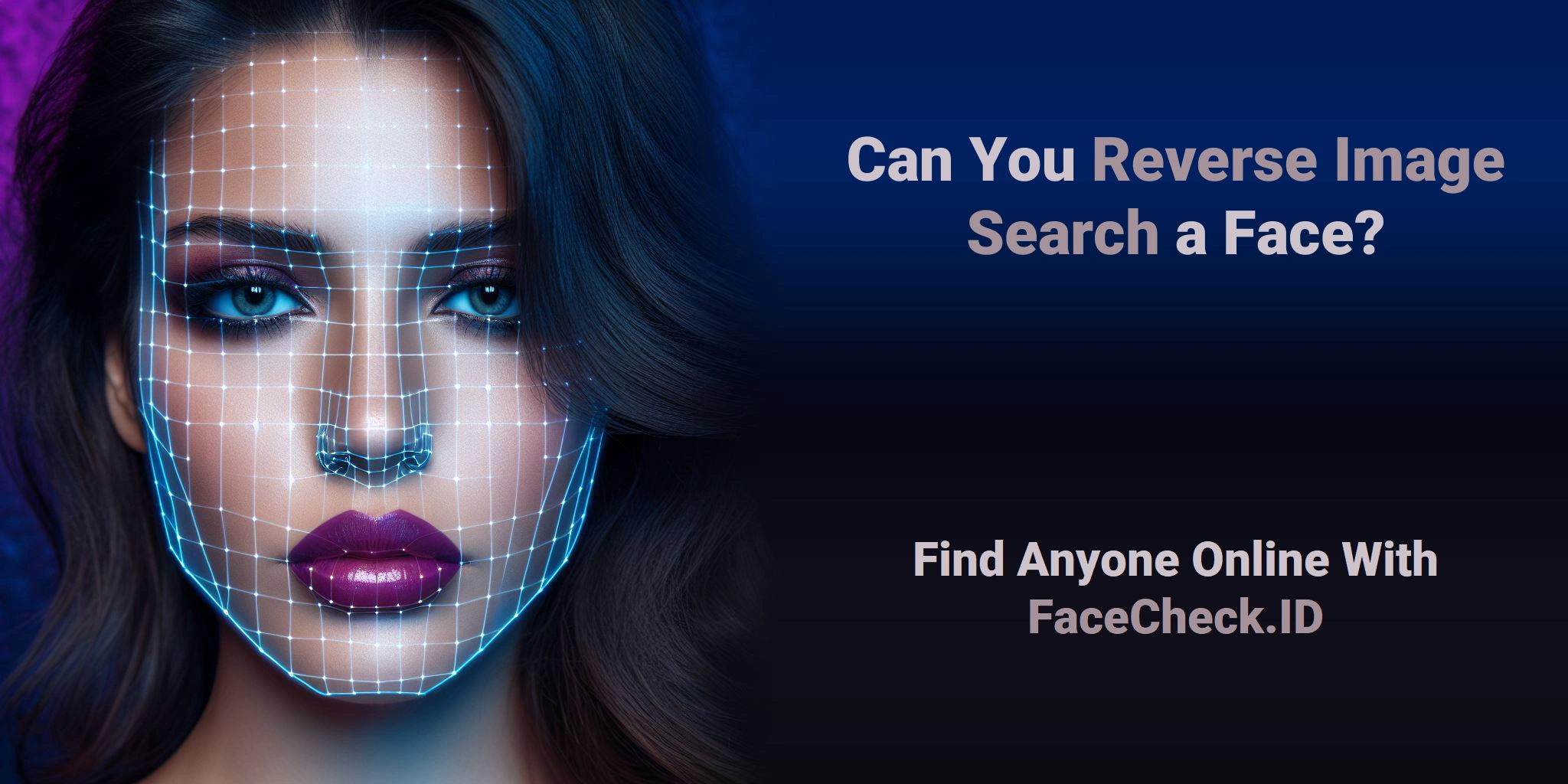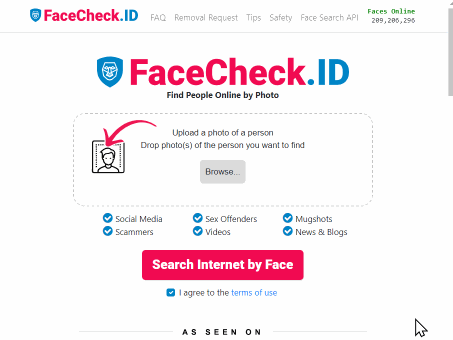Can You Reverse Image Search a Face?
Absolutely! Reverse image searching a face has become more accessible and sophisticated in recent years. By uploading a photo to specialized platforms like FaceCheck.ID or PimEyes, you can scour the internet for matches, potentially finding profiles, articles, or other content where that face appears. It's a powerful tool, especially when trying to verify someone's online identity or track down the source of an image. However, as with all technology, it's essential to use it responsibly and ethically.
In this article, we're going to discuss
- How to Reverse Image Search a Face
- The Legality of Using Facial Recognition Tools
- Is it Illegal to Use PimEyes?
- Any Person can Search a Photo of Anyone Else
- Is it Illegal to Use FaceCheck?
- Exploring Free Facial Recognition Solutions
- Is there a free facial recognition site?
- Is there a free facial recognition?
- Privacy Concerns and Facial Recognition
- What are the risks and ethics of facial recognition tech
- Is it illegal to hide my face?
- The Power of Facial Recognition: Turning Anyone into a Detective
- What facial recognition website can turn anyone into a cop?
- Law Enforcement and Facial Recognition
- How police manipulate facial recognition
- Can the police track your face?
- How Police Cameras Recognize and Track You
How to Reverse Image Search a Face
Searching the Internet by face image is easy:
Go to FaceCheck.ID, upload an image, and click on search
The Legality of Using Facial Recognition Tools
While facial recognition platforms like FaceCheck.ID and PimEyes operate within legal frameworks, it's crucial for users to understand that they bear the responsibility for how they use these tools. Misusing them, such as for stalking or violating someone's privacy, can lead to legal consequences. Always ensure you're using these platforms ethically and in line with their terms of service. Remember, the tool itself is neutral; it's the end user's actions that determine its legality in practice.
Is it Illegal to Use PimEyes?
PimEyes, a renowned facial search engine, allows users to scour the web for images matching a given face, similar to services like FaceCheck.ID. While the platform itself operates within legal parameters, users must adhere to PimEyes' terms of service. Misusing the tool for activities like stalking or violating privacy can lead to legal consequences. Always ensure you're using such platforms ethically and responsibly.
Any Person can Search a Photo of Anyone Else
PimEyes is a facial recognition search engine that creates a "face print" from uploaded photos and searches the web for similar images. While it offers legitimate uses like brand protection, there are concerns about potential misuse, such as by employers or abusive individuals. The platform doesn't index social media but covers other websites. Although users are supposed to upload only their photos, there's no mechanism to ensure this. Packages range from free to $300 a month, with the premium offering features like DMCA takedown requests, though its effectiveness varies. The company emphasizes ethical use but lacks controls against potential abuse.
Is it Illegal to Use FaceCheck?
FaceCheck.ID, specializing in reverse image searching social media platforms like Instagram, FaceBook, and Twitter, is another key player in the facial recognition field. FaceCheck.ID operates legally. However, users should be cautious and ensure they're not infringing on anyone's privacy rights. Always refer to FaceCheck.ID's user agreement, terms of service, and your local laws to stay informed and compliant.
If you're considering using facial recognition for professional purposes, it's wise to consult with a lawyer to ensure you're compliant with all legal regulations.
Exploring Free Facial Recognition Solutions
If you're curious about facial recognition but don't want to break the bank, platforms like FaceCheck.ID and PimEyes have got you covered with their free versions. It's a cool way to dip your toes into the world of face-matching. Just remember, while they're super handy, they do not have all the bells and whistles of the paid versions. And as always, use them wisely and ethically!
Is there a free facial recognition site?
Absolutely! Several websites offer free facial recognition services. FaceCheck.ID and PimEyes both provide free tiers, allowing users to experience basic face-matching capabilities without any cost. Other notable platforms include Betaface and Face++.
Is there a free facial recognition?
Beyond websites, there are software and apps available that offer facial recognition features for free. OpenCV, for instance, is an open-source tool that developers often use for facial recognition projects. While these tools can be powerful, they might require a bit of technical know-how to use effectively.
Privacy Concerns and Facial Recognition
With the rise of facial recognition tools, there's a growing conversation about privacy and how our faces are used online. It's essential to strike a balance between leveraging technology's benefits and ensuring our personal details remain protected.
What are the risks and ethics of facial recognition tech
Facial recognition technology, while offering benefits like identity verification, poses significant ethical and privacy concerns. Its ability to track movements, make judgments, and potentially reinforce human biases raises questions about its responsible development and use. The technology's capacity to uncover personal details, such as health or emotions, prompts concerns about consent and data usage. It's crucial to address these ethical issues and allow individuals a voice in determining the technology's application.
Is it illegal to hide my face?
In most democratic societies, there's no law against hiding your face in public unless it's for malicious intent, such as concealing your identity during a crime. However, certain situations, like security checks at airports or during public events with heightened security, may require you to show your face. It's always essential to respect local laws and regulations, especially in areas with specific face-covering rules or bans.
The Power of Facial Recognition: Turning Anyone into a Detective
With facial recognition, anyone can feel like Sherlock Holmes, spotting faces in seconds. It's a game-changer, but we need to remember to play fair!
What facial recognition website can turn anyone into a cop?
With the rise of advanced facial recognition tools, virtually anyone can delve into detective-like investigations. Platforms like FaceCheck.ID and PimEyes, with their expansive search capabilities, empower users to find facial matches across the internet. However, it's crucial to remember that with great power comes great responsibility. Using these tools to invade someone's privacy or for malicious intent is not only unethical but can also have legal repercussions.
Law Enforcement and Facial Recognition
Law enforcement agencies are increasingly using facial recognition to aid investigations and enhance security measures. However, this adoption sparks debates about privacy, potential misuse, and the accuracy of such technology in policing.
How police manipulate facial recognition
The NYPD once used facial recognition to catch a shoplifter who looked a lot like actor Woody Harrelson. Sounds like something out of a movie, right? A study from Georgetown University found that sometimes police even tweak photos to get a match. Big names like Amazon and Google are hopping on the facial recognition train, but there's a catch. The tech can sometimes get it wrong, especially with women and people of color. While places like Detroit say it's helping reduce crime, others worry about who's keeping an eye on the tech's use. Because of these concerns, some cities have said "no thanks" and banned its use by their police.
Can the police track your face?
Yes, many law enforcement agencies around the world utilize facial recognition technology to identify suspects, find missing persons, and enhance security measures. This technology can scan and match faces from surveillance footage, social media, and other public sources against criminal databases. However, the use of facial recognition by police is a topic of debate, with concerns about privacy, accuracy, and potential misuse. It's essential to stay informed about local regulations and how law enforcement in your area uses this technology.
How Police Cameras Recognize and Track You
Amnesty International discovered over 15,000 public surveillance cameras in New York, and many Americans now own smart security cameras. These cameras have advanced significantly, offering detailed data and intelligent tracking. As they've become more affordable and sophisticated, their use has skyrocketed. Law enforcement has adopted high-resolution cameras and even militarized drones, a trend influenced by America's Middle East engagements. While facial recognition is on the rise, its accuracy is tied to the quality of its data and reference databases.
Read More on Facial Recognition Search
Can you reverse image search a person?
Got a photo but no name? Whether you're checking out a suspicious dating profile, trying to find an old friend, or seeing if someone's picture shows up elsewhere online, regular search engines just won't cut it. Here are some detective-style tricks that can help you uncover the truth behind any face.
On the subject in other languages
Você pode fazer uma pesquisa reversa de imagem de um rosto?
你可以反向搜索一张脸吗?
Můžete provést obrácené vyhledávání obličeje na obrázku?
Können Sie eine Gesichtssuche mit umgekehrter Bildsuche durchführen?
¿Se puede hacer una búsqueda inversa de imágenes de un rostro?
Pouvez-vous faire une recherche inversée d'image d'un visage ?
È possibile fare una ricerca inversa delle immagini di un volto?
顔を逆画像検索することは可能ですか?
얼굴을 역으로 이미지 검색할 수 있나요?
Czy można przeszukiwać obrazy w tył za pomocą twarzy?
Можно ли провести обратный поиск изображений по лицу?
هل يمكنك البحث العكسي عن الصورة لوجه؟
Bir Yüzü Tersine Görüntü Araması Yapabilir Misiniz?
Popular Topics
Face Recognition Search Engine Face Recognition Search Face Search Engine Identity Social Media Image Search Facial Recognition Reverse Image Search Free Facial Recognition Advanced Facial Recognition How To Facebook Instagram Facial Recognition Technology Twitter Law Enforcement PimEyes Facial Search Face Search Face Match Similar Images Identity VerificationBattle of the Face Search Engines: PimEyes and FaceCheck Compared


